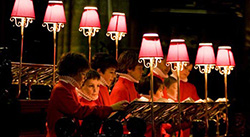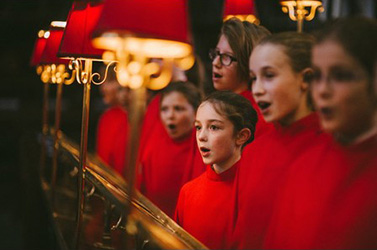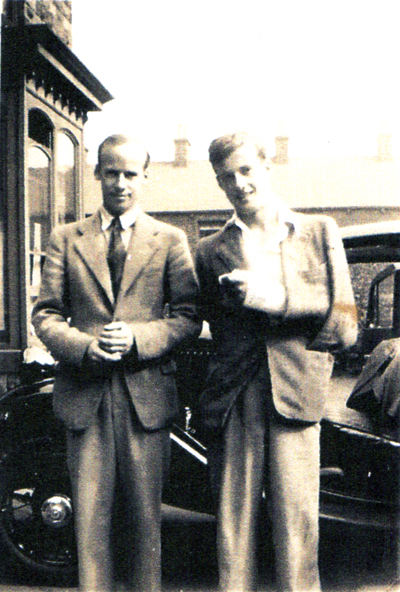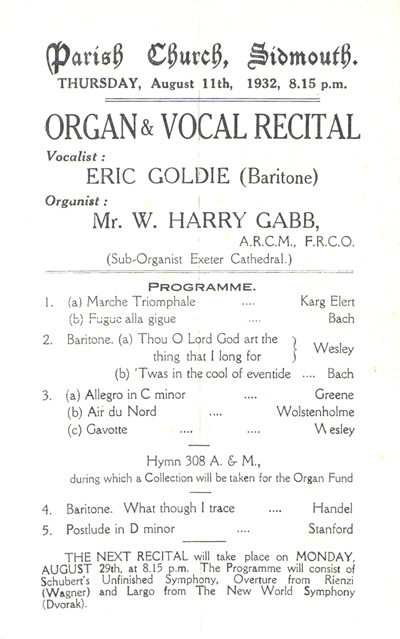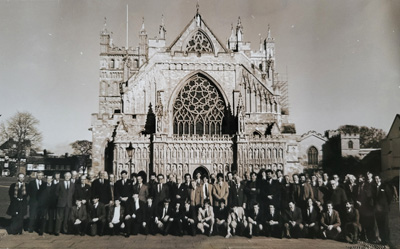Eric Goldie
(1909-1986)
Also Parnell Goldie and Hugh Goldie
Eric Evelyn Goldie was born 18th February 1909 in St Austell, Cornwall. He had a long association with Exeter Cathedral Choir. He was a chorister between 1919 and 1925. He then became a master at the school, teaching Latin and Geography. A fascinating biography of former Exeter chorister Denis Leplastrier Vercoe, who was a chorister from about 1925, says he was taught by Eric at the school.
Eric had two brothers. Parnell Goldie was older by one or two years. Eric's daughter thinks that Parnell was a chorister, but he may not have been as there are no records of him in old ECOCA lists of former choristers (unfortunately, the Cathedral Archive does not have a convenient list of past choristers). Or, Parnell did not join ECOCA, which could have simply been because he moved abroad: he was ordained in the Bath and Wells Diocese, and emigrated to South Africa before WW2, serving as a priest (and later a canon) in Durban. Eric's younger brother, T. Hugh E. Goldie, was a chorister, 1929-1934. Parnell and Hugh went to King’s Taunton after being choristers, but Eric stayed on due to his cricketing skills being vitally important - see below.
Thomas Armstrong's cathedral choir (click on photo for larger version)
Hugh would have sung under Thomas Armstrong (of 'O Little Town of Bethlehem' descant fame - recorded by the Choir in 1928), organist at Exeter 1928-1933. Consequently, he may be included as one of the choristers in a surviving photograph of Armstrong's choir, shown above, but the exact date of the photo is uncertain, so potentially it could have been taken in 1928, the year before Hugh joined. Since Eric carried on singing after his voice broke, and continued at the school as a teacher, he too may be in this photo and potentially also featured in the 1928 recording.
Cricket
Eric (left) and his brother Hugh (arm in plaster).
Eric and Hugh were both ace cricketers, with Hugh being especially good at wicket-keeping. Eric's daughter relates that Eric knitted during one war-time cricket match, of actors v musicians! Knitting while involved in playing a cricket match seems entirely fitting with his lively character; this included being fined £1 for parking at night in Torbay without his car lights being on!
Eric's cricketing prowess was so good that it meant he was kept on as a chorister after his voice broke, singing falsetto. (not something that would happen now!)
Cricket was a highly important aspect of the Choristers' School, as an excerpt from Denis Vercoe's biography (mentioned earlier) reveals:
"... [one of the headmaster's daughter's featured] in the summer in the school yard where, on a batting wicket with collapsible stumps, she would take part in cricket practice. She was a very fine bowler and batswoman [...]. This was an inherited ability from her father who had been a fair cricketer in his time, playing for the Somerset Stagglers.
Cricket was therefore the important game at the Choir School [sic.] and a good cricketer was automatically a favourite of 'the Guv' [the Headmaster]. [...] Another teacher, who was an ex-chorister, and lived in the school, was Eric Goldie; he had become a fine cricketer and was a protege of 'the Guv'."
More information about Eric's cricketing career is available at the Cricket Archive.
Professional Singer
Eric became a very accomplished professional Bass.
He sang as a lay clerk at Manchester Cathedral, then moved to London in his early 20s. He was a Lay Vicar at Westminster Abbey for twelve years, also freelancing with solo work and some theatre (there are several newspaper concert listings for the 1930s, with him being associated with the Abbey). His last 16 years of professional singing were in the BBC Chorus (now the BBC Singers) until 1964, then ad hoc with them until he was 60.
Quoting from Denis Vercoe's biography again:
"After leaving Exeter [Eric Goldie] became a professional singer and had a fine voice. Years later during the war, I attended a performance of Congreve's Love for Love at a London Theatre and was intrigued when, in the interval, the audience was entertained to songs by Eric Goldie."
Flyer for a concert at Sidmouth involving Eric Goldie and Harry Gabb
Harry Gabb (1909–1995), coincidently the same age as Eric, was sub-organist at Exeter, 1929-1937. A past chorister, Eric Dare, (died in 2020 in his mid-90s) sang under Harry Gabb, and thought he is shown in a photo from the 1930s. Gabb left Exeter to go to Llandaff Cathedral (1937-1946), then St Paul's, where he was sub-organist for many years (1946-1974).
An online search for the Sidmouth concert brought up references to it and many more concerts involving Eric Goldie, in the British Newspaper Archive. Eric was clearly an excellent singer as he is praised again and again, and sang all over the country and in Ireland. It seems he was also a renowned treble before his voice broke, as one of the references mentions him as the well-known BBC soprano (curiously this reference does not use 'treble').
Some of the concert listings for the 1940s include Eric's first wife, Lydia Goldie, a pianist and fine accompanist. After Lydia's death (she was some years older than Eric), Eric married Joan.
Eric and ECOCA
Eric was a firm supporter of ECOCA. He frequently attended the Easter Monday Reunions. From the ECOCA June 1969 Newsletter, written by Frank Cotton:
"...At the dinner Mr Michael Dykes Bower was the Guest of Honour in place of Sir Thomas Armstrong who was unable to be present because of illness. Mr Dykes Bower entertained us splendidly with a delighful speech, to which Mr Eric Goldie responded. The Dean, who was in the Chair, once again was in excellent form as a speaker...."
Eric is shown towards the right-hand end of this photograph of the 1981 Reunion (click on the photo for a larger version).
In Memoriam and ECOCA
Eric died 8th July 1986. Only in Easter of that year, he had sung in a performance of Bach's St John Passion.
Eric was clearly held in very high esteem by ECOCA, indicated by a surviving letter from Frank Cotton to Eric's widow, Joan, dated 10th July, written merely two days after Eric's death:
"Please accept my personal sympathy and also from the E.C.O.C.A. on the death of dear Eric.
I have special memories of him, when my mother died suddenly in Feb 1925 he came to take me (aged 6) back to the Choristers School where I lived for a while, and of course he was a master there when I was in the school for 6 years.
We have No 3 magazine coming out in a fortnight and I woud be very grateful if you woud send me a few lines about his life for inclusion in this magazine. It would be a tribute to him. I believe he sang in Westminster Abbey and BBC.
...I always looked forward to talking to him at our Reunions on Easter Monday. I shall miss him."
Similar sentiment is expressed by Frank Sanders, ECOCA Committee, in a letter to Eric's daughter, Sally, 10th August 1986. This letter notes a bequest by Eric to the ECOCA Bursary Fund and then continues:
"You will know how much he contributed to the Choristers' School as a chorister under Dr Bullock and later as a Master when I knew him. These were hard times when much was expected of us, but we were none the worse for that. The boys today have a much more comfortable life, but they work hard and the choir is very good indeed - not so good of course, as in our time naturally! Unfortunately the cost to the Parents of boarding their son has risen from £70 p.a. (I believe) when I was there, to over £3000 p.a. and not only is the choir threatened by these rising costs, but we are in danger of having to take second best because the parents of a boy of musical ability cannot afford the cost. This is where the Bursary Fund comes in.
Your father will be sadly missed by those of us who knew him in those pre-war years, and he made a point of coming to our re-unions."
On 14th August 1986, Frank Cotton wrote again to Joan. Frank mentions Eric's brothers Hugh and Parnell, using the latter's nickname of Pardoe:
"... I am enclosing a copy of our magazine with a tribute about Eric, which I think is very fitting. I have felt especially sad about his death as I had such fond memories of him since 1925.
I am sorry Hugh has not become a member of the ECOCA. I remember him at school [as] he kicked with his left foot bent!!!
Pardoe I remember died in South Africa a few years ago. ..."
Another letter of September 1986 from Frank Sanders mentions a further donation to the Bursary Fund. The letter is addressed to Joan, but the letter's text suggests this is an error, and the letter was in fact sent to Eric's daughter, Sally, as the letter's recipient is asked to send the letter on to Joan, querying the absence of a covering letter with the donation cheque. The letter states that the cheque made the sum total of donations £432. This equates to approximately £1,300 in 2025. Not surprsingly, the letter talks of "another generous donation"!
Reflecting the period when the letters were sent, they are all handwritten and on ECOCA printed letterheaded paper.
Sources
With warmest thanks to Sally, Eric's daughter, for providing many biographical details, memories and copies of: the 1986 letters; photo of Eric and Hugh; and the Sidmouth concert flyer (those copies are now in the Cathedral Archive).
Cricket Archive - https://www.cricketarchive.com/Archive/Players/187/187377/187377.html (accessed October 2025)
Harry Gabb - https://en.wikipedia.org/wiki/Harry_Gabb (accessed October 2025)

